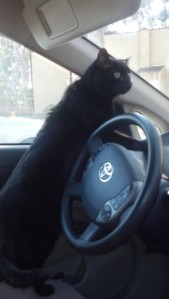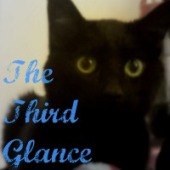Autistic – the word that I first heard applied to me my freshman year of college – it was weighted full of disdain, and I feared it. I feared it, knowing but little of the disorder I’d never really encountered, but had heard some very awful things about.
Autistic – the word that I learned more and more about, as I devoured everything I could read on the subject, which was just so utterly fascinating to me.
Autistic – the word that I learned explained the why of how I interacted with the world. The word that explained nearly everything that made me different from the people I was surrounded by.
Autistic – the word that gave me freedom from my fear and belief that I was just a completely broken person who would never succeed.
Autistic – the word that gave me power over myself and my environment.
Autistic – the word that so utterly perfectly describes me.
So why is it, that I’m so scared to say it aloud?
—————–
One of the things that I’ve mentioned before, is that while I am diagnosed autistic, and being autistic impacts many parts of my life in ways that other people just don’t ever experience, I am not “out” as autistic in my workplaces, lab or classroom. This doesn’t mean that people don’t know there’s something very different about me. They do. But I’m terrified to give the word that explains it all. The stereotypes, the negative views, the preconceived notions, and the horrible assumptions associated with being autistic mean that I am terrified to be open about myself, for fear of all the misconceptions.
As an early-career academic scientist, I don’t want to give anyone any reason at all to discount me. I realize that I’m in a really lucky position, where I don’t have to say my label in order to function (well sort of) in society. The stereotypes and negative regard that come with the word “autistic” are just too scary to contemplate, and I’m lucky that I can, for the most part, get away with not saying it. I can’t risk throwing away my entire career, and I’m privileged enough to be (right now, anyway), in a position where my oddities, quirks, and very autistic self is welcome and accommodated. I’ve built a little niche where I can thrive.
The thing is, the people around me know they’re accommodating me. They know I have difficulties, and that I sometimes have weird challenges they don’t even begin to understand. They know I have to ask for help at strange times, and that I interact with the world differently from them. I’m actually very open about these things, because it is so very obvious to the casual observer. I take control over my situation by being very open and explicit about my difficulties with sound, with talking, with textures and other sensory things. I discuss my difficulties understanding certain kinds of language and I speak openly about sensory processing problems. To deny them would be outright lying, so instead I speak up, I own my quirks, and I talk about them openly. There’s just one thing I don’t disclose. I don’t tell them I’m autistic.
I’m afraid that if I say the word, that I will be labeled forever. That I won’t ever get a job, much less a good one. That even if I do land a job, that I will be constantly doubted, that I won’t get tenure, or that I’ll be forced into positions I shouldn’t be in, all because there’s one little word that people have heard. Please don’t try to change my mind about this. I know there are many wonderful reasons to disclose your diagnosis, but the thing is that most of those reasons would be to the benefit of other people, but right now, it won’t help me. If I tell people I’m autistic, it might help change their views on what autism looks like, what autistic people are capable of. I’m not saying this is not a good thing, it’s just not something I’m comfortable doing.
Several people who know about autism have put 2+2 together. They know I’m autistic. They’re the safe ones – the ones who realize that being autistic isn’t what the stereotypes say. When they hear “I’m autistic”, they hear “I have trouble with a certain set of things, such as verbal and nonverbal communication, sensory processing, etc”. It’s the others I have to worry about, the ones who know about the Hollywood, Autism $peaks, tragedy version of autism. The ones who hear “I’m incapable of doing anything functional, ever” (even though I’ve accomplished a lot to be very proud of that they know about, by any metric). My world is full of the dangerous ones. And right now, I can’t safely open myself up to that kind of scrutiny from the dangerous ones – they hold the power, and I don’t want to be another casualty. Instead, I’m quietly changing the way people perceive me and how I interact with the world, without the word that carries so much force, both positive and negative in my world. And I wanted to share some of the explicit ways that I do so.
This post was prompted by a blog post by a fellow autistic PhD student* who is also in science, who has been struggling lately. This person has been trying to make some very big important decisions, and some of their autistic traits have been making it difficult to communicate with relevant people and work on making those decisions. Like me, they are not openly autistic, and, like me, don’t necessarily want to be, but are struggling with how to deal with their challenges and whether to disclose. I’ve found some wonderful work-around to get the help and understanding I need, and I wanted to share some of them. What follows is an expanded and edited version of the comment I left on their blog.
————–
While I’m often not immediately labeled as “oh, she’s autistic” by casual viewers, most people can tell there’s something very different about how I interact with the world than what they are used to. When those things become a barrier or a problem, I just want to wail “I’m autistic, that’s why!” But the thing is, that isn’t helpful. Most people don’t know what “I’m autistic” means in practical terms. They might know a stereotype, but how that applies to the situation at hand, is almost always useless. What I’ve found is that I can disclose specific things I have difficulty with, without giving it a name. For me, personally, and in my own processing of myself, the word “autism” sums it all up. But when I need to ask for help, when I’m struggling, even if it’s obvious (to me) that it’s struggling because I’m autistic, I give a specific example instead.
I say something like “I have trouble verbally communicating (talking) when I’m nervous. Would it be possible to have a brief email conversation first?” – sometimes they agree, sometimes they don’t. But it is a pretty reasonable request, and gives me some time to show that I can communicate effectively and intelligently before an in person meeting.
Or if it’s something to do with dress code, I’ll say “I have very sensitive skin and need to wear a particular type of clothing or I get very antsy and have a lot of trouble focusing because it feels awful on my skin. Can we work around that?”
When I’m stimmy or agitated or just fiddling with things or rocking, I just do it. If it is commented on, I just say “I like to play with xx, it helps me keep my focus”. Plenty of people have fidget toys. When I get excited and squeal and flap, and people tease me, I say “well I’m just excited”.
If I’m having trouble communicating in a group setting, because it’s busy and full of lots of people and everyone’s talking at once, I’ll say “Sorry, sometimes it’s hard for me to filter out background noise from the voices – your brains do that automatically, but mine doesn’t, and sometimes when I’m tired or overwhelmed, it becomes hard for me to talk or listen. Could we chat in a corner?” (Usually, in those settings that I can’t avoid, I place myself in a corner near the door – corner so my back is protected and I can visually see the whole room, and near a door so I can escape if need be)
Sometimes in the above situation (for example when I’m teaching lab and have 5 students talking at me at once), I just say “Just a second, I can only listen to one at a time, (s)he was first, I’ll get to you guys in a minute”. One of my former students told me recently that all of the class was kind of shocked by that, but they were like “oh, ok, with E, you just wait your turn, and she’ll get to you” – plus, I like to think I was teaching them common courtesy to not talk to a person who is actively engaged in conversation with someone else.
When people comment on my clothing (I’m nearly always wearing jeans and a fleece and socks, even in extremely hot climates), I say either “I get cold easily” or “I have sensitive skin”, or if I’m really feeling up for it, I’ll say something like “I have issues with sensory processing, and I wear particular clothes (long pants/shirt) because air moving on my skin makes me feel sick”. All of these are true.
When I get freaked out by an awful noise, I wait until I’ve calmed down, then if anyone asks, I just say “sometimes loud/ high-pitched/ sudden noises startle me, and it takes me a bit to relax after.”
When someone asks if they can call me, I propose email or text or skype (at least I can see them, and for some reason that makes it a bit better). I can’t get out of all phone calls, but it really helps – and as an added bonus, there’s a written record of the conversation, which is really useful.
When I just don’t understand something, or I’m having trouble processing or communicating, and I need to ask for help, I say so. The words “I’m sorry, I don’t understand what you’re saying, would you mind slowing down or repeating it?” are hard the first few times, but they get easier. The words “Please let me think about that for a moment” are also perfectly acceptable.
When I’m about to have a complete shutdown or meltdown, I have a safe place to hide (my office) and a person (my roommate, works in a building near mine) I can alert to the situation if it gets bad and I need actual support. But usually I just run off.
And (on the rare occasion) when people ask about one of my quirks, I explain.
All of these are viewed as perfectly valid reasons to ask for help or accommodations, or to explain differences. You don’t have to say “I’m autistic” – often it isn’t very productive, since most people who aren’t acquainted with your specific set of issues won’t understand what you need them to do, and, as I discussed above, it can actually harm you in the long run. Instead, just disclose the little difficulty that happens and let them build up over time. Those who know something reasonable about autism will guess, and some may ask you explicitly. Those who don’t, will just think you’re somewhat quirky. But they’ll still be able to interact better with you, assuming they want to. This keeps the “ohhhhhhhhhh she’s autistic and therefore shouldn’t even be able to do grad school” thoughts far away, and replaces it with “well, that’s a little strange, but ok, she knows how to deal with it for herself, so lets move on” – something so much more productive.
I’ve found, generally, that everyone has trouble with different things. Some of us have more trouble with things that others find trivial, and that leads to pathologizing and diagnoses. But everyone has things they aren’t good at. Acknowledging that you have a particular weakness (or several, though I rarely do the barrage all at once – it usually isn’t necessary), is totally fine, and can even help elevate you in the eyes of potential supervisors. Acknowledging it and having a work-around or some other alternative solution, is even better.
Of course, there’ll always be people who respond to things like this negatively, but I’ve found that the vast majority of people respond pretty positively when I disclose a difficulty. Sometimes I don’t have an immediate solution for it, but often I am able to come up with something (especially with a little thought). And it seems to have done me pretty well. Who knows, maybe one day I’ll feel safe using the Autistic label in my workplace. But even so, I’ll still have to explain what my specific needs are in context. For now, I just explain my immediate needs, in small, “safe-to-disclose” chunks, without the label of Autism or Autistic attached.
I know I’m autistic. And I know what that means for me and how to communicate it to people when I need to. And right now, that’s enough.
————-
*If you would like me to link to your post, you know who you are, please let me know and I will edit accordingly. 🙂 EDIT: Post was edited to include a link to Sleep Wake Hope Then’s post “telling autistic“
 We’ve hung out in the car together while it isn’t moving, letting him sniff around and explore all the nooks and crannies. He decided his favorite place was the drivers seat – look out, if you see a wildly driven car in Texas this summer, it might be M at the wheel (just kidding).
We’ve hung out in the car together while it isn’t moving, letting him sniff around and explore all the nooks and crannies. He decided his favorite place was the drivers seat – look out, if you see a wildly driven car in Texas this summer, it might be M at the wheel (just kidding).





